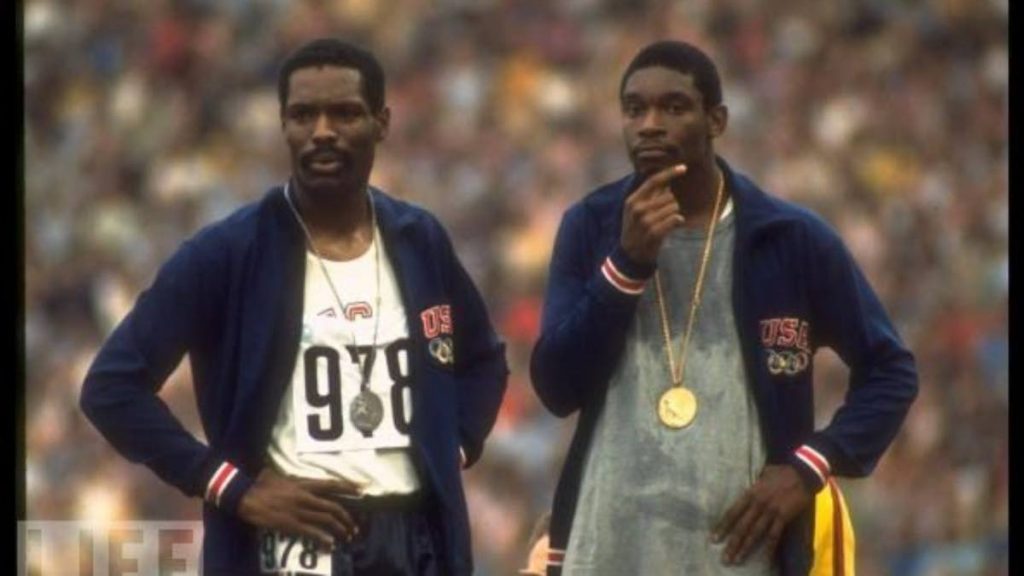THE LIFETIME ban imposed on former American Olympic track and field medallists Vince Matthews and Wayne Collett should be lifted, and the pair awarded the Olympic Order – the highest award of the Olympic Movement.
So says TT Olympic Committee (TTOC) president Brian Lewis who hailed the longevity and continuity of the ban by the International Olympic Committee (IOC) and US Olympic Committee (USOC) for over four decades as “unconscious bias”.
The Caribbean National Olympic Committees (CANOC) president also called for the IOC to reinstate the two African American athletes to the Olympic field after their historic podium protest.
After Matthews and Collett sprinted to 400m gold and silver respectively at the 1972 Munich Olympics, they stood casually atop the podium, one barefoot, hands on hip and the other in a thoughtful repose with his right hand stroking his chin during the playing of the American national anthem. Their disregard for the anthem reflected their anger against at the state of race relations in the US.
Then IOC president Avery Brundage viewed the pair’s behaviour as disrespectful and immediately banned them from the Olympic Games. Ironically, Brundage made the same decision four years earlier in Mexico City, when Tommie Smith and John Carlos accepted their medals after the 200m finals, and raised their black-gloved fists into the air, saluting the struggles of black Americans.
Since his reign at the helm of the local Olympic committee, Lewis has been a public advocate for gender and race equality. After the May 25 police killing of George Floyd, Lewis amplified his fight against racial discrimination with primary emphasis of sport.
“That ban is still in place 48 years now! It’s strange that the then IOC, USOC and IAAF (International Association of Athletics Federations) leadership supported this decision and those who are present now has not seen it fit over this time to remove this ban. To me, it’s a clear result of unconscious bias, no recognition and understanding,” said Lewis.
In 2010, Collett died from cancer so any recognition now would only be posthumous. One year later, Matthews was inducted into the US Track and Field Hall of Fame.
Rule 50 of the Olympic Charter provides a framework to protect the neutrality of sport and the Olympic Games. It states that, “No kind of demonstration or political, religious or racial propaganda is permitted in any Olympic sites, venues or other areas.”
Lewis believes the actions taken by the former American athletes serves as catalysts to the sad climax of Floyd’s death at the hands of a white police officer.
“Rule 50 is linked to 1968 and 1972. It’s not just an apology and a reinstatement of Matthews and Collett I would like to see, but an apology and also consideration be given to them for the Olympic Order. What they have done, to me, is in the highest tradition of Olympism. But they have been demonised for it. In that, it’s an indictment on the entire Olympic Movement. It may be an uncomfortable conversation but the dehumanisation of the black race goes back centuries,” he added.
The local Olympic head admitted the general reluctance to open, revise or revamp their lifetime ban goes back explicitly to a racist mindset and attitude. According to him, glaring injustices which have stood the test of time need to be addressed now more than ever. Lewis even raised the point of racial leadership diversity of international sporting federations which are dominated by whites.
“We have to look at our history and that of the Olympic Movement and identify and accept there are aspects of it that can’t stand scrutiny. The IOC is dealing with gender discrimination but I don’t know why (people) are ‘ducking’ and hiding from the conversation on racial discrimination, inequalities and unconscious bias. We have all been educated, brainwashed and socialised to view the issue of black lives,” he said.
For Lewis, it’s a result of the European domination of the world, as well as the periods of slavery and colonisation. He is of the firm belief that, currently, the Olympic Movement cannot continue to “go along its merry way” with Matthews and Collett still banned. Their ban proves, according to him, their stance for equality among all races has been stonewalled due to the fact that the ban still stands to date.
Lewis also called on potential detractors of his mission to not focus on where this message is coming from, the Caribbean. Since he has opted to reopen the significance of the athletes’ stance and, more importantly, the fact their bans remains in effect, he has received an array of supporting comments from multiple members of international sporting bodies.
He questioned their silence.
“I’ve had regional and international Olympic leaders reaching out to me privately indicating my bravery. But the question is why aren’t they prepared to publicly do it? The reality is there’s a fear of raising uncomfortable issues in the Olympic Movement because people are afraid to do so because they’re afraid of the IOC. Why do we feel we have to constantly avoid speaking the truth?” Lewis asked.
On Monday, the CANOC boss shared similar sentiments with insidethegames.com journalist Phillip Barker. Here, he highlighted that the entire sport eco-system, black and white, has to undergo unconscious bias training.
Lewis remains bold and confident on his stance.
“I’m not afraid of repercussions because it’s the right thing. If you look at the history that led up to Rule 50 under Avery Brundage and the then executive of the IOC, and the fact that the treatment meted out to Smith, Carlos, Norman, Matthews and Collett, there have been a history of other people protesting and them being addressed. Is it because they were white? The fact that Matthews' and Collett’s ban has never been reinstated speaks volumes,” he stated.
When asked if he would accept support from other entities, Lewis replied, “When you are taking a stance like this there are no troops to rally.”

